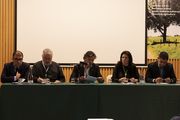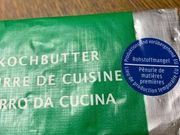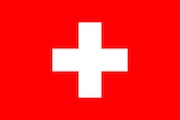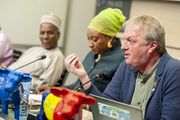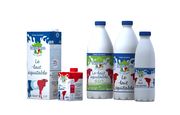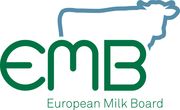EMB Newsletter January 2020
Newsletter as PDF
Contact
EMB - European Milk Board asbl
Rue de la Loi 155
B-1040 Bruxelles
Phone: +32 - 2808 - 1935
Fax: +32 - 2808 - 8265
Dear dairy farmers, dear interested parties,

Never start to quit, never quit starting!
We begin the new year with these thoughts by Roman philo-sopher Cicero. We push on. We are going to continue our political engagement for a healthy dairy market. And we will run our farms back home on the basis of a solid economic foundation.
What can we expect in 2020? The reform of the Common Agricultural Policy remains an interesting topic on which negotiations will continue. The decision on the funds allocated to agriculture within the EU budget is also awaited. The consequences of Brexit are looming and, of course, the economic framework conditions for us dairy farmers still remain a mystery. At the end of the day, what will our milk statements look like in 2020?
Climate change and digitalisation are the new European Commission's flagship policies. Both areas are very important for us dairy farmers. Climate change is significantly changing the shape of the EU budget. The European Commission would like to dedicate a fourth of the total EU budget for climate and environment-related issues. In the future, agricultural and structural funds shall also be more closely linked to the goal of climate neutrality and climate change actions.
Farmers have been contemplating the effects of climate change for a long time now, and are actively working on solutions. In fact, we will be presenting a paper on this very topic at the International Green Week in Berlin this month. It will outline the basic conditions that we producers must first have in order to, thereafter, be able to even start dealing with environmental requirements. You can find out more about agriculture and environmental action in the article by APROLEP, our new member organisation from Portugal, where they touch on some measures for sustainable dairy farming.
This edition of the newsletter also includes two interesting reports from our Swiss colleagues. The farmers' trade union Uniterre expresses its anger at imported butter on shelves in Migros supermarkets. Another article talks about the additional payment for cheese-making, which has not been appropriately passed on to dairy farmers.
We also showcase one more project within our "Fair Milk" series. This time around, we present our French colleagues and their brand FaireFrance, which has made fair remuneration for milk a reality.
And last but not least, some good news. We have achieved an important interim goal within last year's campaign on dumping exports of fat-filled milk powder: Data on fat-filled milk powder will be compiled and published by the European Commission as of 2020. We are very happy to see that the efforts by colleagues from Africa and by hard-working NGOs have led to this important step that will ensure more transparency and is a pre-condition to protecting local milk production in Africa.
Our commitment has paid off. It is clear that we can make things happen in Brussels and in our respective countries as well!
On that note: I wish you all a happy New Year 2020 and let's keep going!
Roberto Cavaliere, Member of the Executive Committee of the European Milk Board and President of APL Italy
Portuguese dairy farmers aim for zero-carbon milk
Uniterre's dairy committee outraged at imported butter on shelves in Migros
An illegal practice in Switzerland permits fraud to the tune of millions in the context of the additional payment for milk used in cheese-making
Important interim goal achieved: Data on fat-filled milk powder will be compiled and published by the European Commission as of 2020
Fair Milk in France
How can EU milk production be climate-friendly as well as socially and economically sustainable?
Impressum
European Milk Board asbl
Rue de la Loi 155
B-1040 Bruxelles
Phone: +32 2808 1935
Fax: +32 2808 8265
E-Mail: office@europeanmilkboard.org
Website: http://www.europeanmilkboard.org

